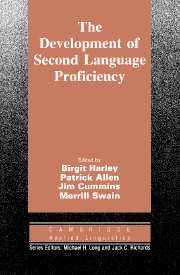Book contents
- Frontmatter
- Contents
- List of contributors
- Series editors' preface
- Acknowledgments
- Introduction
- I THE NATURE OF LANGUAGE PROFICIENCY
- II CLASSROOM TREATMENT
- III SOCIAL AND INDIVIDUAL VARIABLES
- Chapter 9 Social and individual factors in the development of bilingual proficiency
- Chapter 10 Social and individual factors in language acquisition: some models of bilingual proficiency
- Chapter 11 The role of context and age in the development of bilingual proficiency
- Chapter 12 The relationship between first and second languages: language proficiency and language aptitude
- Chapter 13 Response by DBP project members to the discussion papers of Richard Bourhis and Alison d'Anglejan
- IV PRACTICAL AND POLICY IMPLICATIONS
- V THIRTY-FIVE YEARS OF RESEARCH ON BILINGUALISM
- CONCLUSION
- References
- Author Index
- Subject Index
Chapter 12 - The relationship between first and second languages: language proficiency and language aptitude
Published online by Cambridge University Press: 05 October 2012
- Frontmatter
- Contents
- List of contributors
- Series editors' preface
- Acknowledgments
- Introduction
- I THE NATURE OF LANGUAGE PROFICIENCY
- II CLASSROOM TREATMENT
- III SOCIAL AND INDIVIDUAL VARIABLES
- Chapter 9 Social and individual factors in the development of bilingual proficiency
- Chapter 10 Social and individual factors in language acquisition: some models of bilingual proficiency
- Chapter 11 The role of context and age in the development of bilingual proficiency
- Chapter 12 The relationship between first and second languages: language proficiency and language aptitude
- Chapter 13 Response by DBP project members to the discussion papers of Richard Bourhis and Alison d'Anglejan
- IV PRACTICAL AND POLICY IMPLICATIONS
- V THIRTY-FIVE YEARS OF RESEARCH ON BILINGUALISM
- CONCLUSION
- References
- Author Index
- Subject Index
Summary
The focus in the social context and age section of the DBP report (Volume HI of Harley, Allen, Cummins, and Swain 1987), is on the relationship between individual and social-environmental factors and the development of bilingual proficiency. The report is rich and stimulating. The findings are of considerable interest to researchers, and even the questions raised by the report move the field forward. There is a great deal to discuss, but I would like to restrict my remarks to the topics of language proficiency and language aptitude. Language aptitude receives little explicit attention in the report, but I will argue that it is a factor of considerable importance in understanding the relationship between first and second language proficiency.
Individual differences in language
learning I would like to begin by making some comments on current theory and individual differences in language learning. Then I will turn to some research on individual differences, before addressing the question of language aptitude generally.
Current theory and individual differences
universal grammar theory
As I read the Zeitgeist in first and second language research, there seems to be a resurgence of interest in the Chomsky an notion of an independent language-learning faculty. Advocates of a Universal Grammar approach to language learning (e.g., White 1985b, 1987a) maintain that, in addition to relatively close-to-surface levels of syntactic representation, there are more abstract levels of representation which children learning a first language cannot induce simply from the data presented to them in adult speech.
- Type
- Chapter
- Information
- The Development of Second Language Proficiency , pp. 158 - 174Publisher: Cambridge University PressPrint publication year: 1990
- 23
- Cited by



